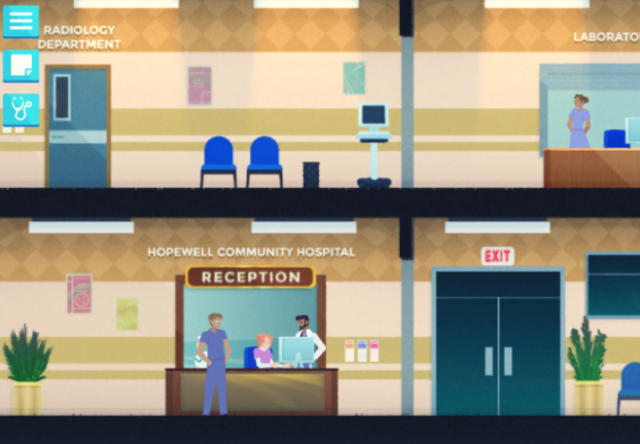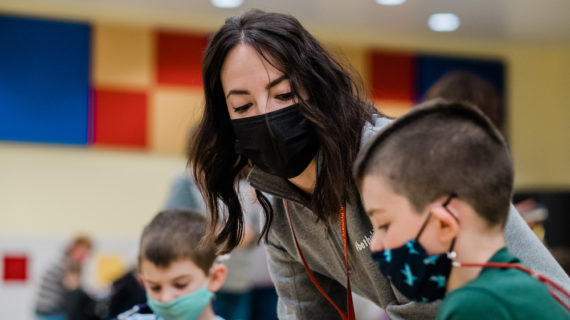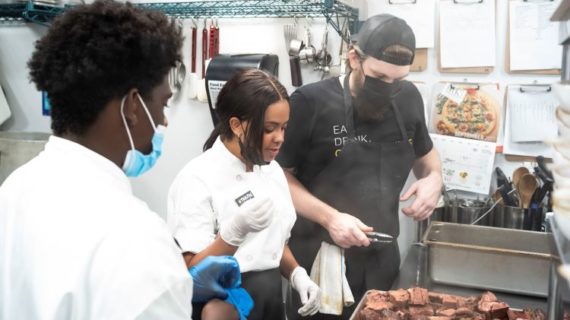
Learn to make video games for free? Schell Games and CCAC announce first-of-its-kind apprenticeship
This article first appeared at NEXTpittsburgh.com, a media partner of Kidsburgh. Sign up here for NEXTpittsburgh’s free newsletter filled with all the latest news about the people driving change in our city and the innovative and cool things happening here. Photo above courtesy of Schell Games.
For any kid thinking about a future career, video game creator probably falls somewhere between astronaut and ice cream taster — that is, very high on the list. And now that playing video games for a living is even (somehow) a valid career for a few, making new games is a job that’s here to stay for good. So, it’s perhaps not too much of a surprise that CCAC (the Community College of Allegheny County) is designing a curriculum for game designers and that Pittsburgh’s biggest gaming company, Schell Games, is partnering with the college on a new apprenticeship program.
What is surprising is that Schell Games will pay the full tuition for the apprentices. Yes, the company is going to pay you to learn how to make video games.
OK, there is a catch. The inaugural class, starting this fall, is limited to two people.
The Schell Games Apprenticeship Program is a hybrid training curriculum that will guide aspiring gaming professionals through a three-year associate degree in multimedia programming, simulation and gaming. The program combines classroom study (20 hours per week) and paid on-the-job training (20 hours) at the Schell Games offices in Station Square, including professional training and development, a company-specific curriculum and project work. Students will work side-by-side with game developers on actual projects to gain crucial real-world experience.
“The only way to keep up with the pace of automation and close the skills gap is for public education and private companies to come together in new ways,” says Rebecca DuPont, department head of computer information technologies with CCAC. “We hope that this initiative with Schell Games is a template for business and academia alike.”

Schell Games is a 20-year-old Pittsburgh success story in a sector that’s growing exponentially. It reports to be “the largest full-service education and entertainment game development company in the United States.”
Schell has created games of all kinds for virtually all platforms, but it has carved out a niche for games that teach and train players for real-world experiences. For example, a game called Night Shift shows players how to deal with the high-pressure triage situations of an emergency room doctor, and was developed in collaboration with a University of Pittsburgh professor of critical care medicine and surgery.
Schell is currently working in the growing market for virtual reality games. It is developing a virtual reality version of the game Among Us (created by game studio Innersloth), which has tens of millions of players worldwide. The game HistoryMaker VR puts learners in the shoes of famous historical figures such as Benjamin Franklin and Abraham Lincoln — and is free to educators. Another Schell project is a VR sword fighting game called Until You Fall.
Apprenticeships were once the exclusive province of the trade industries. But the model seems adaptable to technology fields as well.
“Game development companies today need to be as innovative in our recruitment and development of talent as we do in our games and applications,” says Schell Games CEO Jesse Schell. “This partnership with CCAC is the first degree-granting apprenticeship program in the games industry. It represents a grassroots effort for the greater Pittsburgh community but also a first step in the creation of a broader, deeper talent pipeline inclusive of students who can’t or choose not to attend four-year universities.”
Students interested in applying can do so through the CCAC website. Applications must include a 300-word essay describing the student’s strengths and what they hope to gain from the program. A selection committee will interview finalists and select apprentices no later than July.






